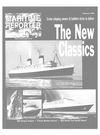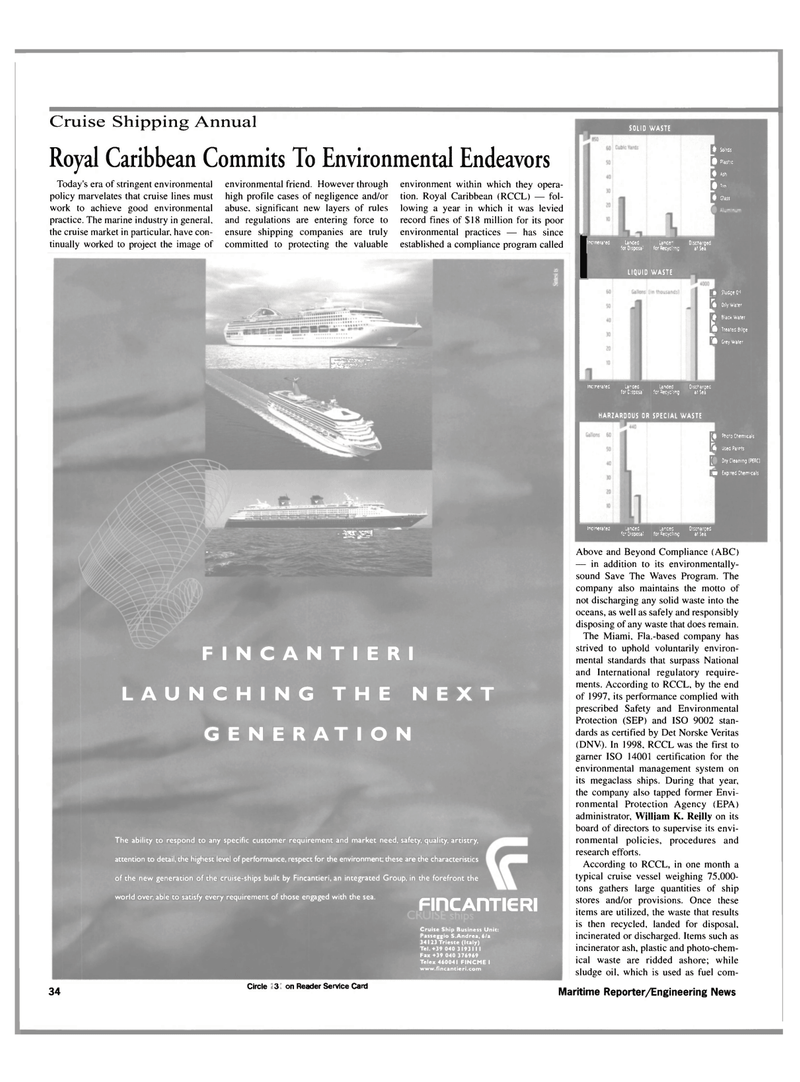
Page 34: of Maritime Reporter Magazine (February 2000)
Read this page in Pdf, Flash or Html5 edition of February 2000 Maritime Reporter Magazine
Cruise Shipping Annual SOLID WASTE
Royal Caribbean Commits To Environmental Endeavors
Today's era of stringent environmental policy marvelates that cruise lines must work to achieve good environmental practice. The marine industry in general, the cruise market in particular, have con- tinually worked to project the image of environmental friend. However through high profile cases of negligence and/or abuse, significant new layers of rules and regulations are entering force to ensure shipping companies are truly committed to protecting the valuable environment within which they opera- tion. Royal Caribbean (RCCL) — fol- lowing a year in which it was levied record fines of $18 million for its poor environmental practices — has since established a compliance program called hp - • - .. gigg?
FINCANTIERI
LAUNCHING THE NEXT
GENERATION
The ability to respond to any specific customer requirement and market need, safety, quality, artistry, attention to detail, the highest level of performance, respect for the environment; these are the characteristics of the new generation of the cruise-ships built by Fincantieri, an integrated Group, in the forefront the world over, able to satisfy every requirement of those engaged with the sea. FinCAnTIGRI
Cruise Ship Business Unit:
Passeggio S.Andrea, 6/a 34123 Trieste (Italy)
Tel. +39 040 31931 II
Fax +39 040 376949
Telex 460041 FINCME I www.fincantieri.com
I
9 SoMs
§ Plastic
§ ASK
9 T LIQUID WASTE
* Sludge S'i
ft OilyWaier
pi Black Water
M Treated Bilge
M Srey Water
Incirerated Landed Landed Discharged
for Cispcsa' for hcytiing at Sea
HARZARDOUS OR SPECIAL WASTE
P Photo Chemicals
5f Used Paints
[ Dry Cleaning (PEPCi
m Expired Chem'cals
incinerated jnced Lances Discharged
for Disposal for Recycling at Sea
Above and Beyond Compliance (ABC)
— in addition to its environmentally-
sound Save The Waves Program. The
company also maintains the motto of
not discharging any solid waste into the
oceans, as well as safely and responsibly
disposing of any waste that does remain.
The Miami. Fla.-based company has
strived to uphold voluntarily environ-
mental standards that surpass National
and International regulatory require-
ments. According to RCCL, by the end
of 1997, its performance complied with
prescribed Safety and Environmental
Protection (SEP) and ISO 9002 stan-
dards as certified by Det Norske Veritas
(DNV). In 1998, RCCL was the first to
garner ISO 14001 certification for the
environmental management system on
its megaclass ships. During that year,
the company also tapped former Envi-
ronmental Protection Agency (EPA)
administrator, William K. Reilly on its
board of directors to supervise its envi-
ronmental policies, procedures and
research efforts.
According to RCCL, in one month a
typical cruise vessel weighing 75,000-
tons gathers large quantities of ship
stores and/or provisions. Once these
items are utilized, the waste that results
is then recycled, landed for disposal,
incinerated or discharged. Items such as
incinerator ash, plastic and photo-chem-
ical waste are ridded ashore; while
sludge oil, which is used as fuel com-
34 Circle 317 on Reader Service Card Maritime Reporter/Engineering News

 33
33

 35
35
